Abstract
The association between exposure to naphtha and neurobehavioural measures was examined prospectively over one year among workers employed at an automotive plant that used naphtha to calibrate fuel injectors. The neurobehavioural tests included those that assess mood, basic intelligence, and functioning of the cerebral frontal lobes and limbic system and were designed so that acute, reversible, and chronic effects of solvent exposure could be assessed. Participants were 248 workers in June 1988, and the testing was repeated on 185 of these workers in 1989. Concentrations of naphtha at the plant ranged from six to 709 mg/m3, although exposure was greater in 1988 than in 1989. Duration of exposure for individual subjects ranged from 0.8 to 7.3 years. Cross sectional data analyses showed significant associations between level of exposure to naphtha and slower timed scores on trails A, and greater reports of negative affective symptoms on profile of mood states scales in 1988 but not 1989. Threshold model analyses of the 1989 data showed an association between score on visual reproductions immediate recall and daily exposure to naphtha at or above 1050 h x mg/m3. Models of chronic exposure showed no associations between chronic exposure and negative neurobehavioural outcome. Results suggest that naphtha produces mild acute reversible effects on function of the central nervous system at or above daily exposures of 540 h x mg/m3 (approximately 90 ppm/h).
Full text
PDF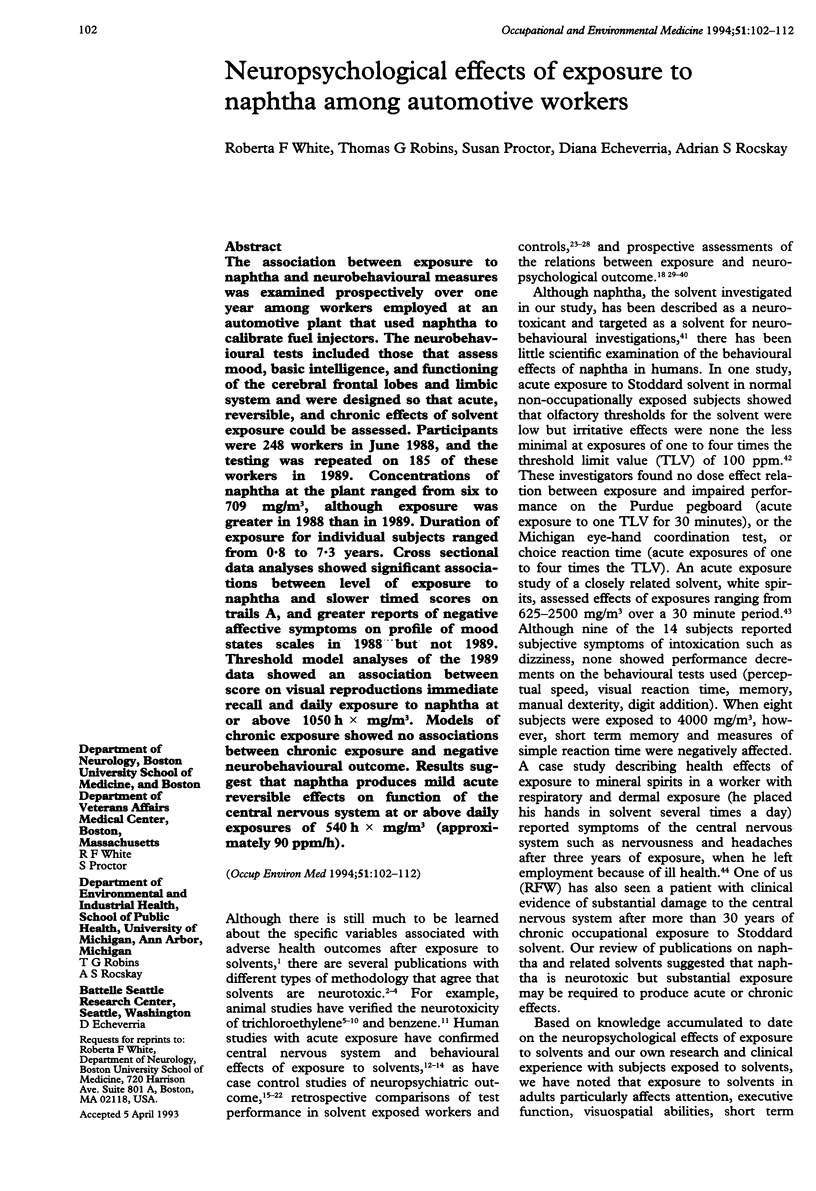
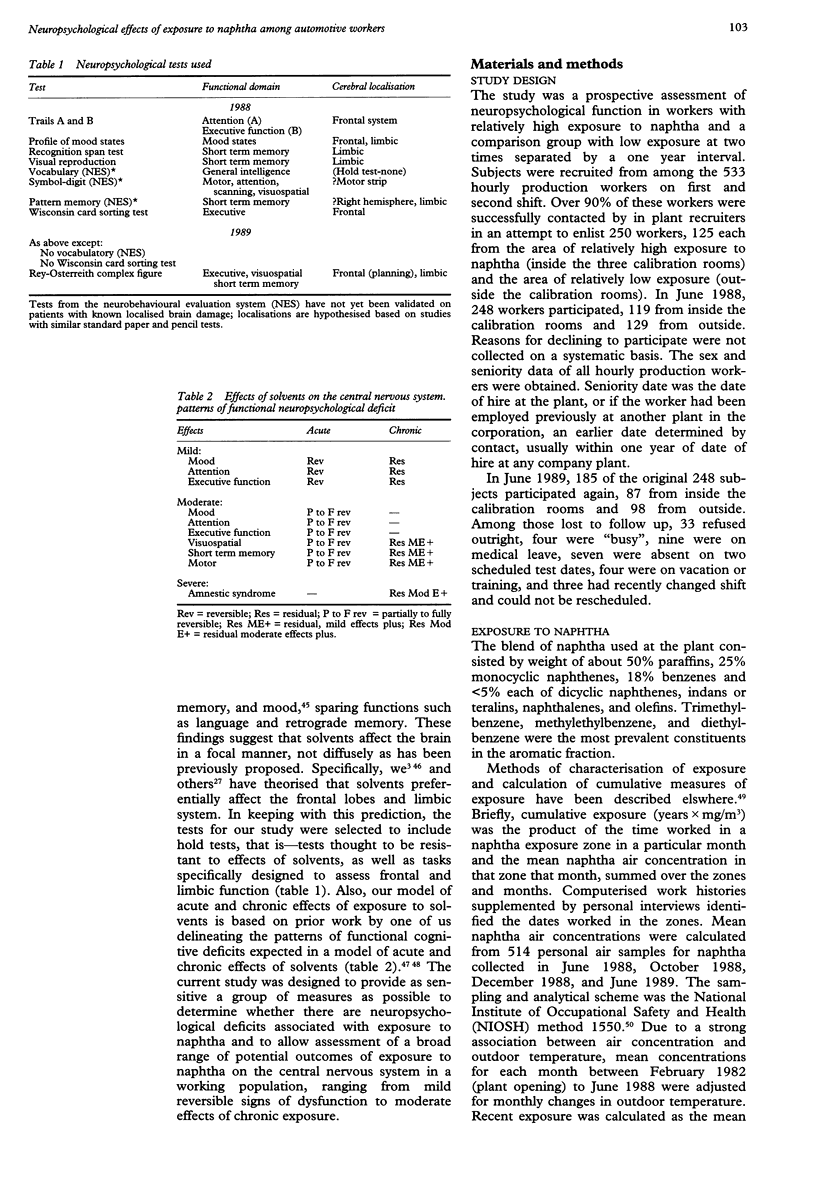
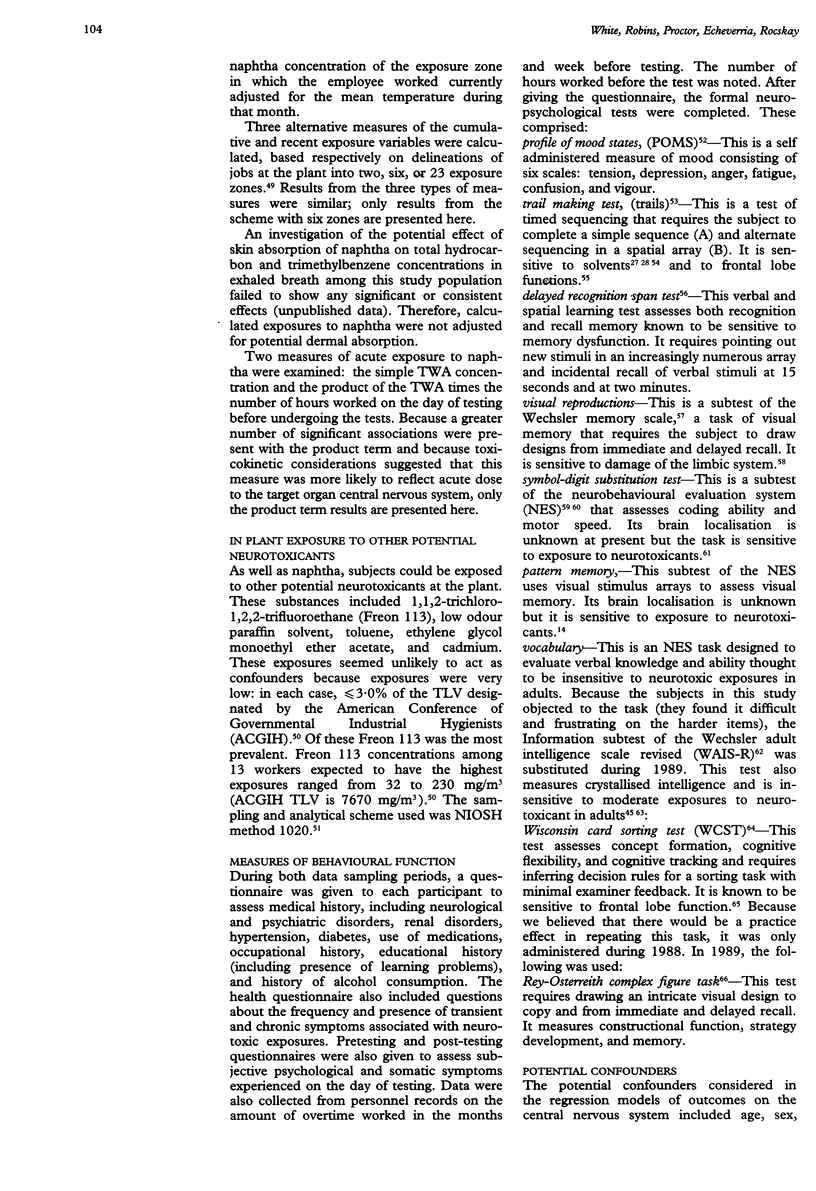
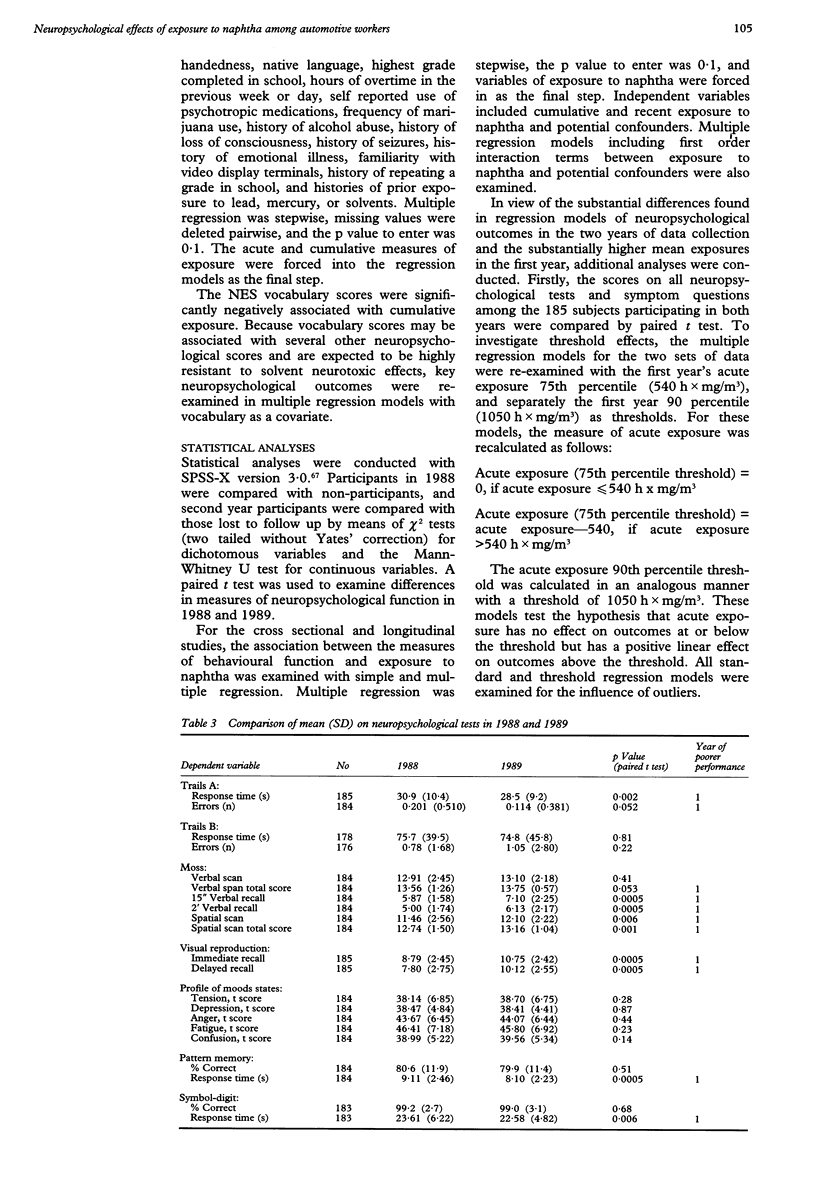
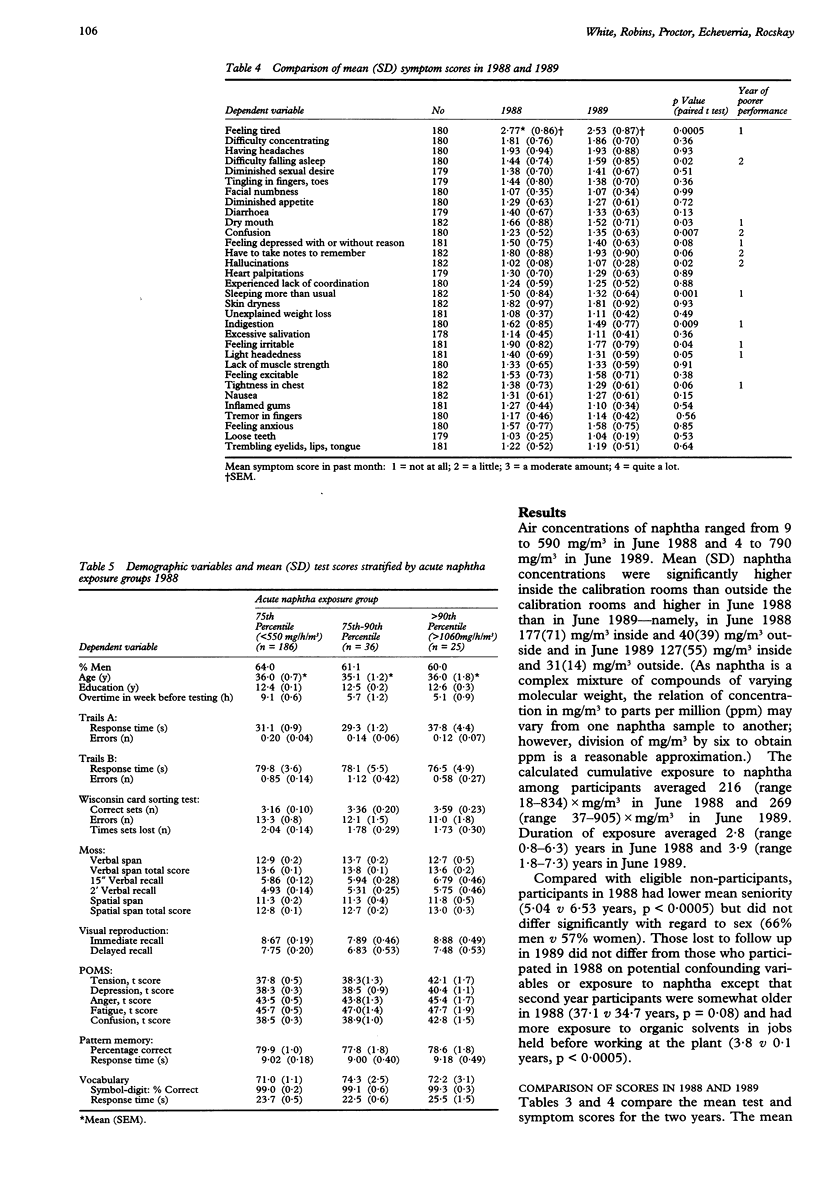
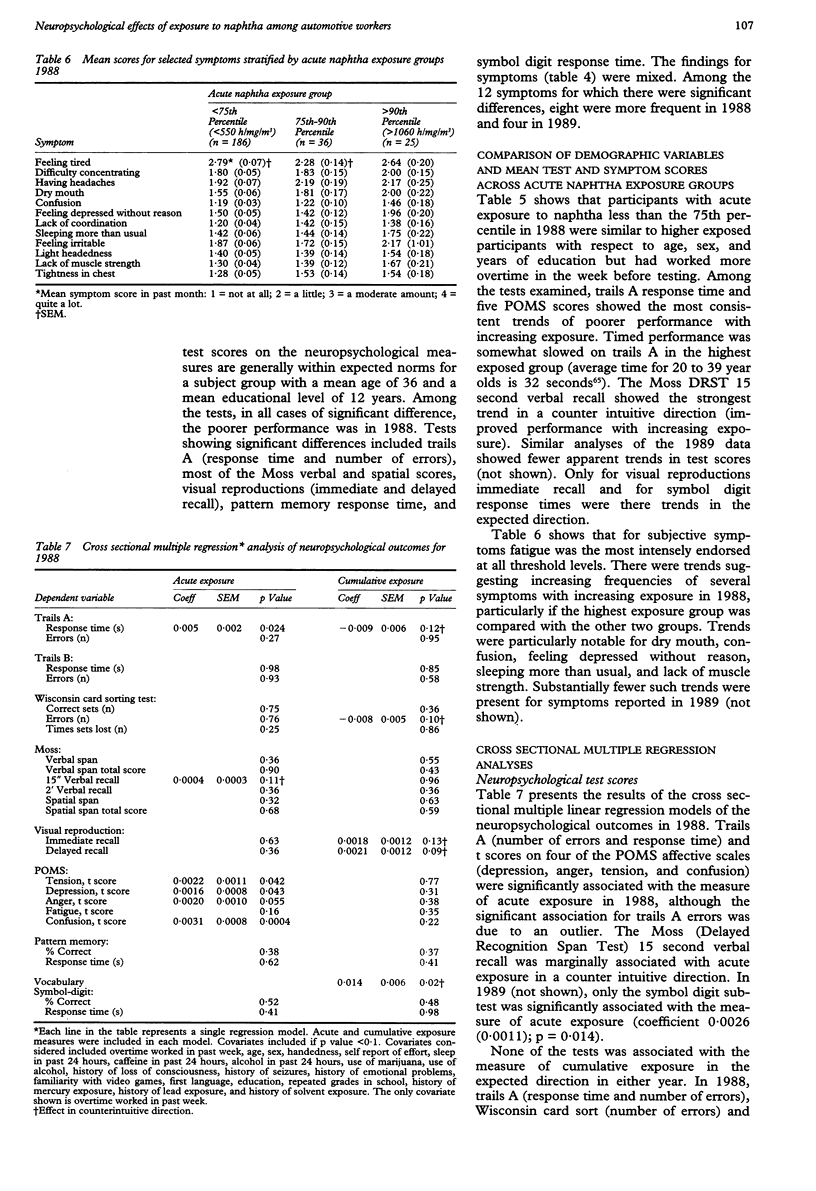
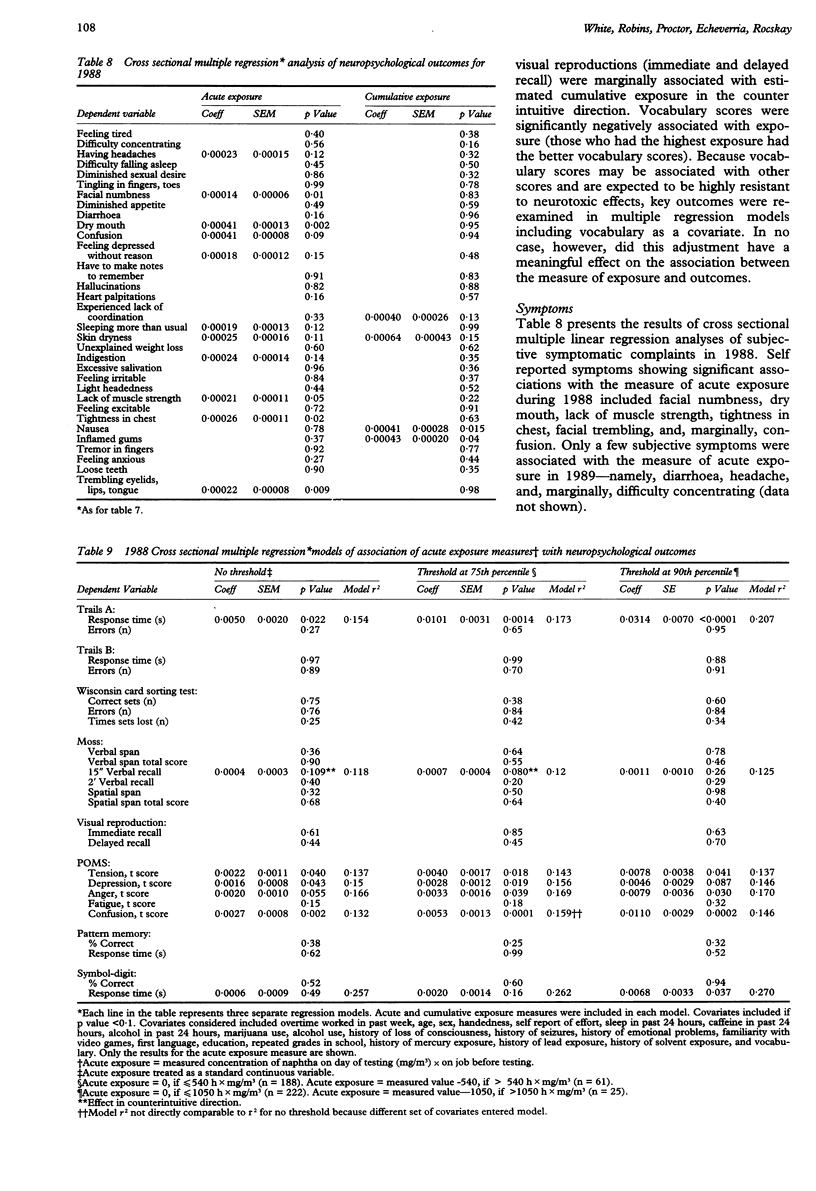
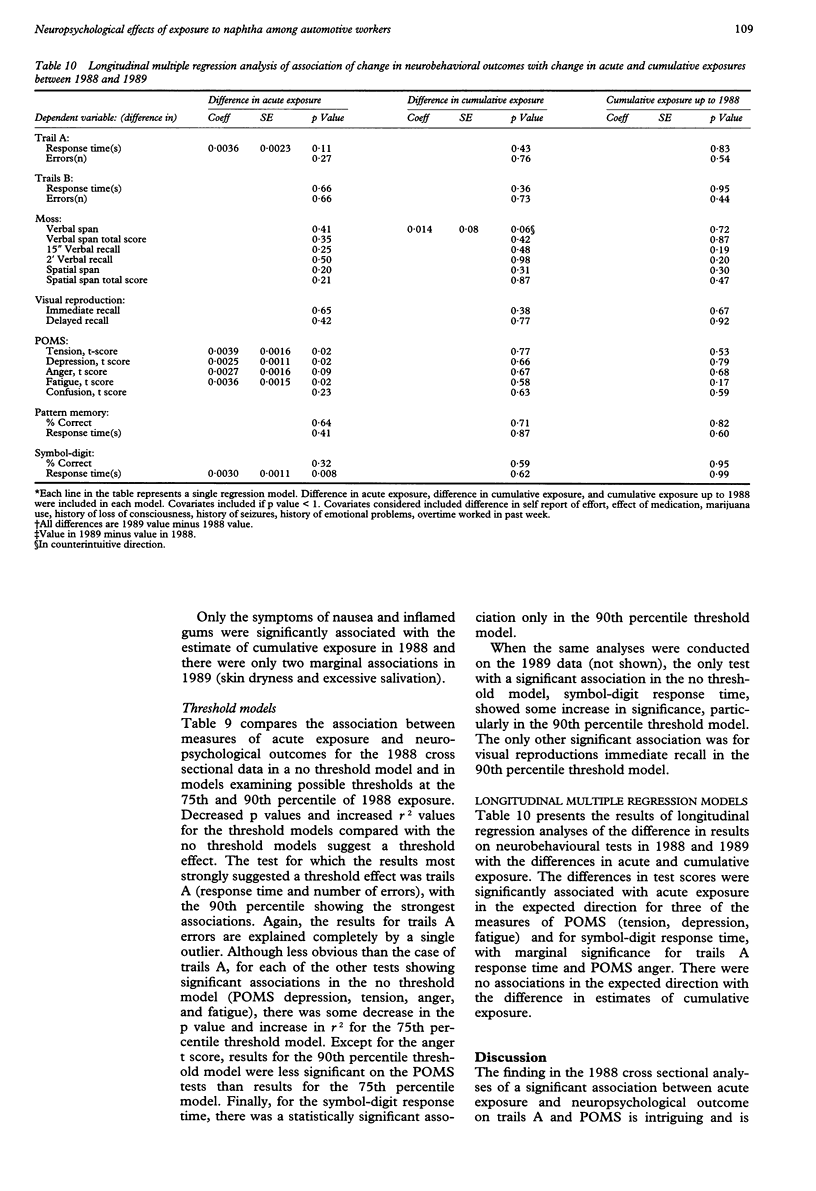
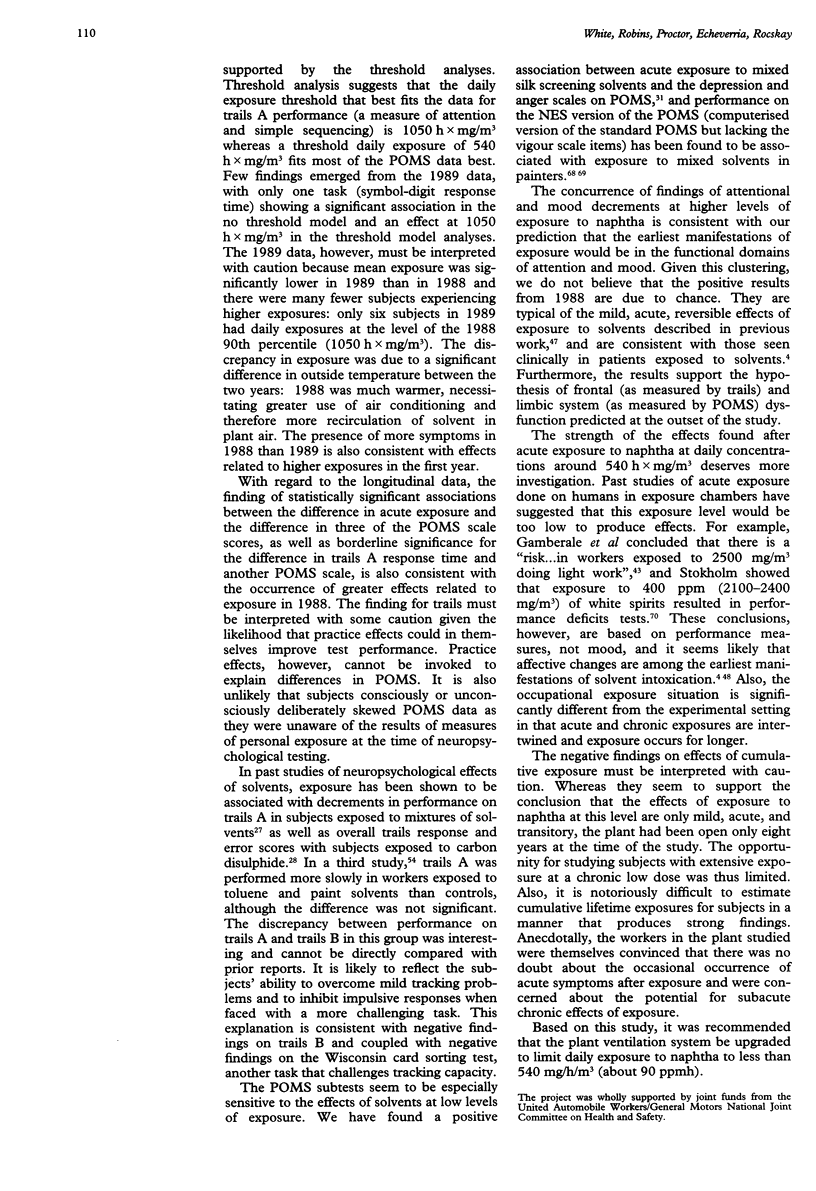
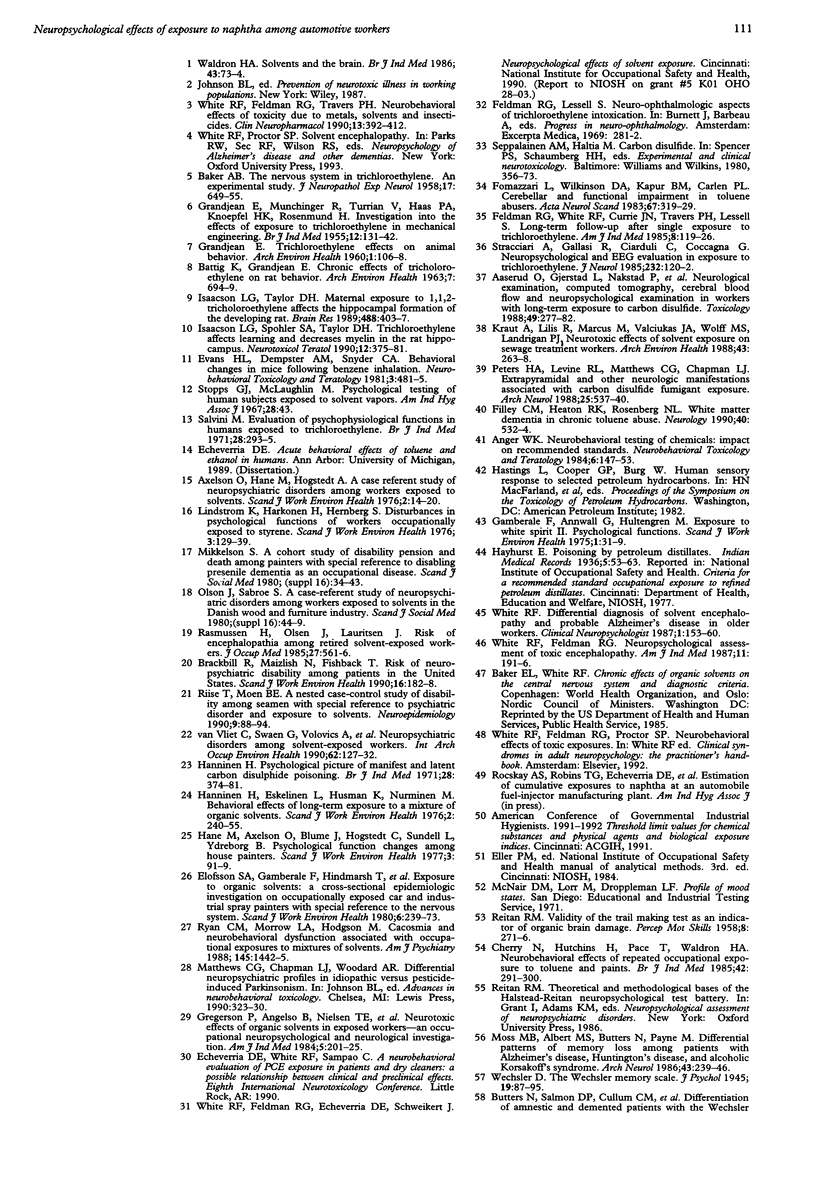
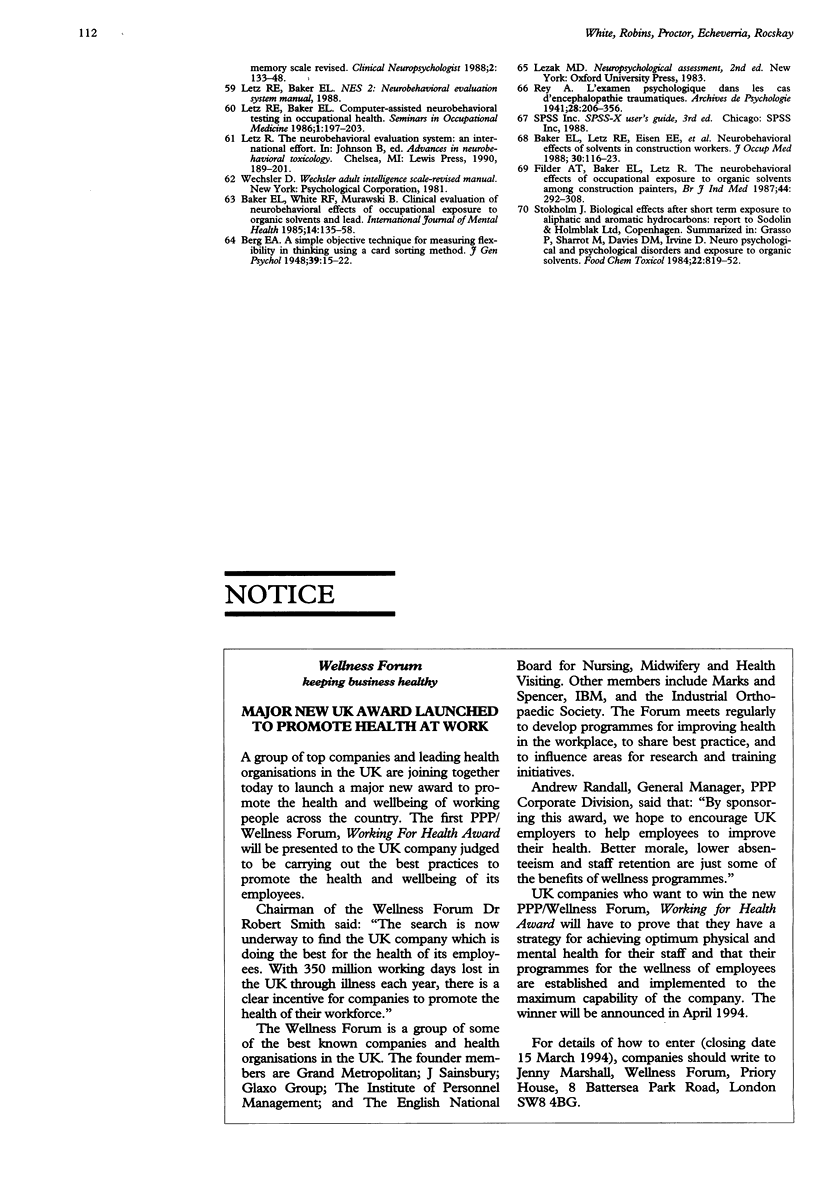
Selected References
These references are in PubMed. This may not be the complete list of references from this article.
- Aaserud O., Gjerstad L., Nakstad P., Nyberg-Hansen R., Hommeren O. J., Tvedt B., Russell D., Rootwelt K. Neurological examination, computerized tomography, cerebral blood flow and neuropsychological examination in workers with long-term exposure to carbon disulfide. Toxicology. 1988 May;49(2-3):277–282. doi: 10.1016/0300-483x(88)90009-1. [DOI] [PubMed] [Google Scholar]
- Anger W. K. Neurobehavioral testing of chemicals: impact on recommended standards. Neurobehav Toxicol Teratol. 1984 Mar-Apr;6(2):147–153. [PubMed] [Google Scholar]
- Axelson O., Hane M., Hogstedt C. A case-referent study on neuropsychiatric disorders among workers exposed to solvents. Scand J Work Environ Health. 1976 Mar;2(1):14–20. doi: 10.5271/sjweh.2826. [DOI] [PubMed] [Google Scholar]
- BAKER A. B. The nervous system in trichloroethylene intoxication; an experimental study. J Neuropathol Exp Neurol. 1958 Oct;17(4):649–655. doi: 10.1097/00005072-195810000-00014. [DOI] [PubMed] [Google Scholar]
- BATTIG K., GRANDJEAN E. CHRONIC EFFECTS OF TRICHLOROETHYLENE ON RAT BEHAVIOR. EFFECTS ON SWIMMING PERFORMANCE, EXPLORATORY BEHAVIOR, AND MAZE AND AVOIDANCE LEARNING. Arch Environ Health. 1963 Dec;7:694–699. doi: 10.1080/00039896.1963.10663602. [DOI] [PubMed] [Google Scholar]
- Baker E. L., Letz R. E., Eisen E. A., Pothier L. J., Plantamura D. L., Larson M., Wolford R. Neurobehavioral effects of solvents in construction painters. J Occup Med. 1988 Feb;30(2):116–123. [PubMed] [Google Scholar]
- Brackbill R. M., Maizlish N., Fischbach T. Risk of neuropsychiatric disability among painters in the United States. Scand J Work Environ Health. 1990 Jun;16(3):182–188. doi: 10.5271/sjweh.1796. [DOI] [PubMed] [Google Scholar]
- Cherry N., Hutchins H., Pace T., Waldron H. A. Neurobehavioural effects of repeated occupational exposure to toluene and paint solvents. Br J Ind Med. 1985 May;42(5):291–300. doi: 10.1136/oem.42.5.291. [DOI] [PMC free article] [PubMed] [Google Scholar]
- Elofsson S. A., Gamberale F., Hindmarsh T., Iregren A., Isaksson A., Johnsson I., Knave B., Lydahl E., Mindus P., Persson H. E. Exposure to organic solvents. A cross-sectional epidemiologic investigation on occupationally exposed care and industrial spray painters with special reference to the nervous system. Scand J Work Environ Health. 1980 Dec;6(4):239–273. doi: 10.5271/sjweh.2609. [DOI] [PubMed] [Google Scholar]
- Evans H. L., Dempster A. M., Snyder C. A. Behavioral changes in mice following benzene inhalation. Neurobehav Toxicol Teratol. 1981 Winter;3(4):481–485. [PubMed] [Google Scholar]
- Feldman R. G., White R. F., Currie J. N., Travers P. H., Lessell S. Long-term follow-up after single toxic exposure to trichloroethylene. Am J Ind Med. 1985;8(2):119–126. doi: 10.1002/ajim.4700080206. [DOI] [PubMed] [Google Scholar]
- Fidler A. T., Baker E. L., Letz R. E. Neurobehavioural effects of occupational exposure to organic solvents among construction painters. Br J Ind Med. 1987 May;44(5):292–308. doi: 10.1136/oem.44.5.292. [DOI] [PMC free article] [PubMed] [Google Scholar]
- Filley C. M., Heaton R. K., Rosenberg N. L. White matter dementia in chronic toluene abuse. Neurology. 1990 Mar;40(3 Pt 1):532–534. doi: 10.1212/wnl.40.3_part_1.532. [DOI] [PubMed] [Google Scholar]
- Fornazzari L., Wilkinson D. A., Kapur B. M., Carlen P. L. Cerebellar, cortical and functional impairment in toluene abusers. Acta Neurol Scand. 1983 Jun;67(6):319–329. doi: 10.1111/j.1600-0404.1983.tb03149.x. [DOI] [PubMed] [Google Scholar]
- GRANDJEAN E., MUNCHINGER R., TURRIAN V., HASS P. A., KNOEPFEL H. K., ROSENMUND H. Investigations into the effects of exposure to trichlorethylene in mechanical engineering. Br J Ind Med. 1955 Apr;12(2):131–142. doi: 10.1136/oem.12.2.131. [DOI] [PMC free article] [PubMed] [Google Scholar]
- GRANDJEAN E. Trichloroethylene effects on animal behavior. The effects of trichloroethylene vapors on a food motivated conditioned climbing reaction of rats. Arch Environ Health. 1960 Aug;1:106–108. doi: 10.1080/00039896.1960.10662674. [DOI] [PubMed] [Google Scholar]
- Gamberale F., Annwall G., Hultengren M. Exposure to white spirit. II. Psychological functions. Scand J Work Environ Health. 1975 Mar;1(1):31–39. doi: 10.5271/sjweh.2863. [DOI] [PubMed] [Google Scholar]
- Grasso P., Sharratt M., Davies D. M., Irvine D. Neurophysiological and psychological disorders and occupational exposure to organic solvents. Food Chem Toxicol. 1984 Oct;22(10):819–852. doi: 10.1016/0278-6915(84)90121-2. [DOI] [PubMed] [Google Scholar]
- Gregersen P., Angelsø B., Nielsen T. E., Nørgaard B., Uldal C. Neurotoxic effects of organic solvents in exposed workers: an occupational, neuropsychological, and neurological investigation. Am J Ind Med. 1984;5(3):201–225. doi: 10.1002/ajim.4700050305. [DOI] [PubMed] [Google Scholar]
- Hane M., Axelson O., Blume J., Hogstedt C., Sundell L., Ydreborg B. Psychological function changes among house painters. Scand J Work Environ Health. 1977 Jun;3(2):91–99. doi: 10.5271/sjweh.2785. [DOI] [PubMed] [Google Scholar]
- Hänninen H., Eskelinen L., Husman K., Nurminen M. Behavioral effects of long-term exposure to a mixture of organic solvents. Scand J Work Environ Health. 1976 Dec;2(4):240–255. doi: 10.5271/sjweh.2805. [DOI] [PubMed] [Google Scholar]
- Hänninen H. Psychological picture of manifest and latent carbon disulphide poisoning. Br J Ind Med. 1971 Oct;28(4):374–381. [PMC free article] [PubMed] [Google Scholar]
- Isaacson L. G., Spohler S. A., Taylor D. H. Trichloroethylene affects learning and decreases myelin in the rat hippocampus. Neurotoxicol Teratol. 1990 Jul-Aug;12(4):375–381. doi: 10.1016/0892-0362(90)90057-j. [DOI] [PubMed] [Google Scholar]
- Isaacson L. G., Taylor D. H. Maternal exposure to 1,1,2-trichloroethylene affects myelin in the hippocampal formation of the developing rat. Brain Res. 1989 May 29;488(1-2):403–407. doi: 10.1016/0006-8993(89)90739-7. [DOI] [PubMed] [Google Scholar]
- Kraut A., Lilis R., Marcus M., Valciukas J. A., Wolff M. S., Landrigan P. J. Neurotoxic effects of solvent exposure on sewage treatment workers. Arch Environ Health. 1988 Jul-Aug;43(4):263–268. doi: 10.1080/00039896.1988.10545947. [DOI] [PubMed] [Google Scholar]
- Lindström K., Härkönen H., Hernberg S. Disturbances in psychological functions of workers occupationally exposed to styrene. Scand J Work Environ Health. 1976 Sep;2(3):129–139. doi: 10.5271/sjweh.2811. [DOI] [PubMed] [Google Scholar]
- Moss M. B., Albert M. S., Butters N., Payne M. Differential patterns of memory loss among patients with Alzheimer's disease, Huntington's disease, and alcoholic Korsakoff's syndrome. Arch Neurol. 1986 Mar;43(3):239–246. doi: 10.1001/archneur.1986.00520030031008. [DOI] [PubMed] [Google Scholar]
- Peters H. A., Levine R. L., Matthews C. G., Chapman L. J. Extrapyramidal and other neurologic manifestations associated with carbon disulfide fumigant exposure. Arch Neurol. 1988 May;45(5):537–540. doi: 10.1001/archneur.1988.00520290069016. [DOI] [PubMed] [Google Scholar]
- Rasmussen H., Olsen J., Lauritsen J. Risk of encephalopathia among retired solvent-exposed workers. A case-control study among males applying for nursing home accommodation or other types of social support facilities. J Occup Med. 1985 Aug;27(8):561–566. [PubMed] [Google Scholar]
- Riise T., Moen B. E. A nested case-control study of disability pension among seamen, with special reference to neuropsychiatric disorders and exposure to solvents. Neuroepidemiology. 1990;9(2):88–94. doi: 10.1159/000110755. [DOI] [PubMed] [Google Scholar]
- Ryan C. M., Morrow L. A., Hodgson M. Cacosmia and neurobehavioral dysfunction associated with occupational exposure to mixtures of organic solvents. Am J Psychiatry. 1988 Nov;145(11):1442–1445. doi: 10.1176/ajp.145.11.1442. [DOI] [PubMed] [Google Scholar]
- Salvini M., Binaschi S., Riva M. Evaluation of the psychophysiological functions in humans exposed to trichloroethylene. Br J Ind Med. 1971 Jul;28(3):293–295. doi: 10.1136/oem.28.3.293. [DOI] [PMC free article] [PubMed] [Google Scholar]
- Stopps G. J., McLaughlin M. Psychophysiological testing of human subjects exposed to solvent vapors. Am Ind Hyg Assoc J. 1967 Jan-Feb;28(1):43–50. doi: 10.1080/00028896709342484. [DOI] [PubMed] [Google Scholar]
- Stracciari A., Gallassi R., Ciardulli C., Coccagna G. Neuropsychological and EEG evaluation in exposure to trichloroethylene. J Neurol. 1985;232(2):120–122. doi: 10.1007/BF00313914. [DOI] [PubMed] [Google Scholar]
- Waldron H. A. Solvents and the brain. Br J Ind Med. 1986 Feb;43(2):73–74. doi: 10.1136/oem.43.2.73. [DOI] [PMC free article] [PubMed] [Google Scholar]
- White R. F., Feldman R. G., Travers P. H. Neurobehavioral effects of toxicity due to metals, solvents, and insecticides. Clin Neuropharmacol. 1990 Oct;13(5):392–412. doi: 10.1097/00002826-199010000-00002. [DOI] [PubMed] [Google Scholar]
- van Vliet C., Swaen G. M., Volovics A., Tweehuysen M., Meijers J. M., de Boorder T., Sturmans F. Neuropsychiatric disorders among solvent-exposed workers. First results from a Dutch case-control study. Int Arch Occup Environ Health. 1990;62(2):127–132. doi: 10.1007/BF00383589. [DOI] [PubMed] [Google Scholar]


